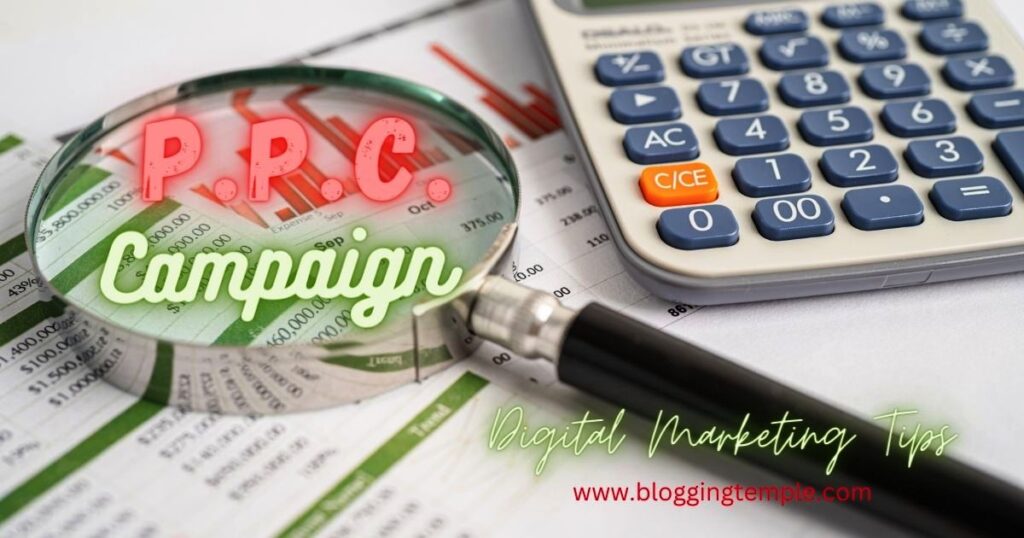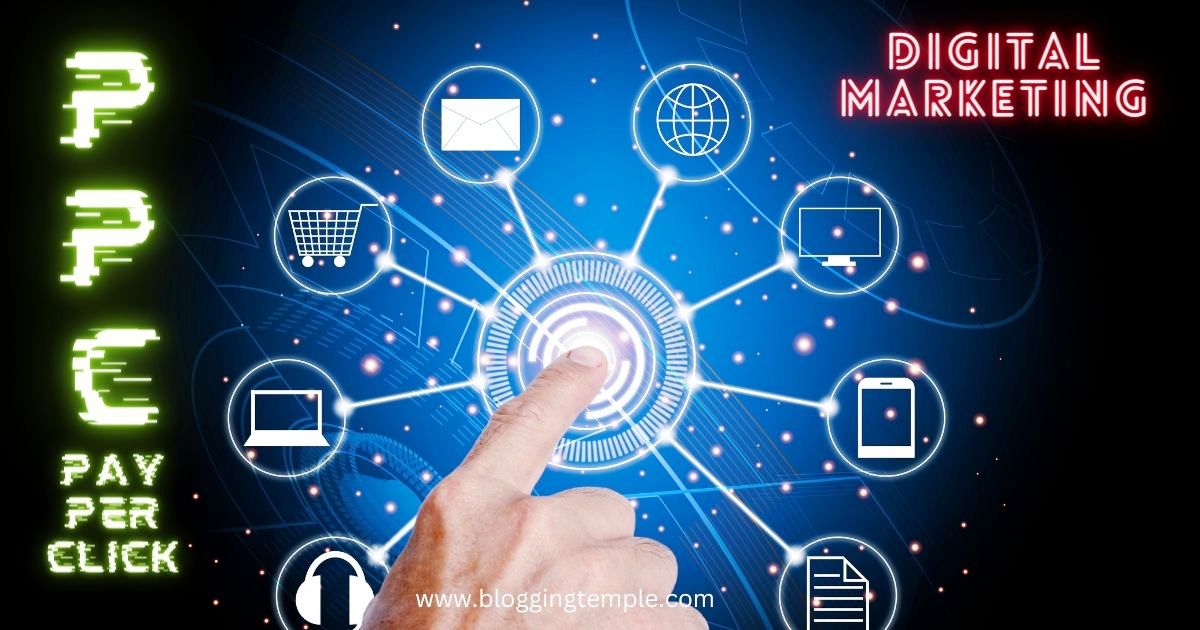In this article, we will explore the ins and outs of PPC marketing, its benefits, and how you can create a winning PPC campaign to drive business growth. PPC marketing, short for Pay-Per-Click marketing, is a digital advertising model where advertisers pay a fee each time their ad is clicked. The digital landscape is ever evolving and businesses are constantly seeking effective ways to reach their target audience and boost their online presence.
Table of Contents
Earn Money by Making Videos: https://bloggingtemple.com/video-marketing-a-revolution-in-21st-century

Introduction to PPC Marketing
PPC marketing, short for Pay-Per-Click marketing, is a digital advertising model where advertisers pay a fee each time their ad is clicked. It allows businesses to display ads on search engines, websites, and social media platforms, targeting specific keywords, demographics, or user behaviors. Unlike traditional advertising methods, PPC provides a cost-effective and measurable way to promote products or services online. One strategy that has proven to be highly successful is PPC Marketing.
Understanding Pay-Per-Click Advertising
Pay-Per-Click advertising operates on a bidding system, where advertisers compete for ad placement in search engine results or other ad spaces. When a user performs a search query or visits a website that displays ads, an auction takes place to determine which ads are shown. Factors such as bid amount, ad relevance, and quality score influence the ad’s position and visibility.
Benefits of PPC Marketing
PPC marketing offers numerous benefits for businesses looking to enhance their online visibility and drive targeted traffic. Firstly, it provides instant visibility and immediate results, unlike organic search engine optimization (SEO) that requires time and effort. Secondly, PPC allows precise targeting, enabling businesses to reach their ideal customers based on specific demographics, locations, or interests. Moreover, PPC campaigns provide measurable data and analytics, enabling advertisers to track their return on investment (ROI) and optimize their strategies accordingly.
Learn About Digital Marketing-https://bloggingtemple.com/what-is-digital-marketing-learn-earn/(opens in a new tab)
How PPC Marketing Works?
In today’s digital age, online advertising has become an essential component of marketing strategies. Pay Per Click (PPC) advertising is a popular online advertising model that offers businesses a cost-effective way to reach their target audience. This article will guide you through the fundamental aspects of how PPC works and why it can be a valuable tool for your business.
What is Pay Per Click (PPC)?
PPC is an online advertising model where advertisers pay a fee each time their ad is clicked. It is a way to buy visits to your website rather than earning them organically. The most common PPC platform is search engine advertising, where ads are displayed alongside search results.
When a user enters a search query related to your business, your ad may appear at the top or bottom of the search engine results page (SERP). The position of your ad depends on various factors such as bid amount, quality score, and ad relevance. If a user clicks on your ad, you pay the predetermined cost per click.
Benefits of Pay Per Click Advertising
Increased Website Traffic:
PPC advertising can drive targeted traffic to your website, increasing the chances of conversions and sales. With proper keyword research and ad targeting, you can reach potential customers who are actively searching for products or services like yours.
Targeted Audience:
One of the significant advantages of PPC is the ability to target specific demographics, locations, and interests. This precise targeting ensures that your ads are shown to the right audience, maximizing the return on your advertising investment.
Cost Control:
PPC allows you to have full control over your advertising budget. You can set a daily or monthly budget, ensuring that you never spend more than your allocated amount. Additionally, you only pay when someone clicks on your ad, making it a cost-effective advertising method.
Setting Up a Pay Per Click Campaign
To run a successful PPC campaign, proper planning and execution are essential. Here are the key steps to get started:
Choosing the Right Keywords:
Keyword research is crucial in PPC advertising. Identify relevant keywords that your target audience is likely to search for. Use keyword research tools to find high-volume keywords with moderate competition to maximize your ad’s exposure.
Creating Engaging Ad Copy:
Craft compelling ad copy that grabs the user’s attention and encourages them to click. Highlight your unique selling points and include a clear call-to-action to entice users to visit your website.
Setting a Budget:
Determine your advertising budget and allocate funds accordingly. Start with a conservative budget and monitor the campaign’s performance before scaling up your spending.
Ad Auction and Ad Rank
PPC advertising operates on an auction-based system. When a user searches for a keyword, an ad auction takes place to determine the ad’s position on the SERP. Ad rank is calculated based on factors like quality score and bid amount.
Quality Score:
Quality score measures the relevance and quality of your keywords, ad copy, and landing page. Higher quality scores can lead to better ad positions at lower costs.
Bid Amount:
The bid amount is the maximum amount you are willing to pay for a click on your ad. It is an essential factor in determining your ad’s position in the auction.
Ad Extensions:
Ad extensions are additional pieces of information that can enhance your ad’s visibility and engagement. Utilize ad extensions like site links, call extensions, or review extensions to provide more information to users and improve your ad’s performance.
Monitoring and Optimizing a PPC Campaign
Running a successful PPC campaign requires ongoing monitoring and optimization. Here are some essential steps to optimize your campaign:
Tracking Conversions:
Set up conversion tracking to measure the effectiveness of your PPC campaigns. Track actions like form submissions, purchases, or sign-ups to evaluate the campaign’s success.
Ad Performance Analysis:
Regularly analyze your ad performance metrics, such as click-through rate (CTR) and conversion rate. Identify underperforming ads and make necessary adjustments to improve their performance.
Ad Testing and Experimentation:
Continuously test different ad variations, landing pages, and targeting options to optimize your campaign. A/B testing can help you identify the most effective elements and refine your strategy accordingly.
Common Mistakes to Avoid in PPC Advertising
While PPC can be highly effective, there are common mistakes that advertisers should avoid:
Poor Keyword Selection:
Choosing irrelevant or overly competitive keywords can result in wasted ad spend. Conduct thorough keyword research and select keywords that align with your target audience’s search intent.
Irrelevant Landing Pages:
Ensure that your ads direct users to relevant landing pages that match their search intent. Irrelevant landing pages can lead to high bounce rates and low conversions.
Ignoring Analytics:
Failing to track and analyze campaign data can hinder your ability to make informed decisions. Utilize analytics tools to gain insights into your campaign’s performance and make data-driven optimizations.
Learn More to Improve your Knowledge: https://www.binaryeducation.in/
Key Elements of a Successful PPC Campaign

To launch a successful PPC campaign, several key elements need to be considered. Let’s delve into each of these crucial components:
1. Keyword Research and Selection
Effective keyword research is the foundation of any successful PPC campaign. By identifying relevant keywords that align with your business goals and target audience’s search intent, you can ensure your ads are displayed to the right people at the right time. Utilize keyword research tools and consider long-tail keywords for better targeting and higher conversion rates.
2. Ad Copy Creation
Compelling ad copy is vital to capture users’ attention and entice them to click on your ads. Craft persuasive, concise, and benefit-driven ad copy that communicates your unique selling propositions and encourages action. Experiment with different variations and perform A/B testing to optimize your ad copy for maximum effectiveness.
3. Landing Page Optimization
A well-optimized landing page is crucial for maximizing the conversion rate of your PPC campaigns. Ensure your landing page aligns with the ad’s messaging and provides a seamless user experience. Optimize it for fast loading speed, mobile responsiveness, and clear call-to-action buttons. Incorporate persuasive elements such as customer testimonials, trust badges, and limited-time offers to boost conversions.
4. Setting Up Conversion Tracking
Conversion tracking allows you to measure the effectiveness of your PPC campaigns and determine which keywords and ads are driving the most conversions. Implement conversion tracking codes or pixels on your website to track important actions, such as purchases, form submissions, or newsletter sign-ups. Use this data to refine your campaigns and allocate your budget more efficiently.
Starting Steps for PPC Marketing Processes
PPC (Pay-Per-Click) marketing can be a highly effective strategy for businesses to reach their target audience and drive valuable traffic to their websites. However, to ensure a successful PPC campaign, it is crucial to follow a series of starting steps that lay the foundation for a well-optimized and targeted marketing process. In this article, we will explore the essential starting steps for PPC marketing processes.
Step 1: Set Clear Goals and Objectives
Before diving into PPC marketing, it is essential to establish clear goals and objectives for your campaign. Ask yourself what you want to achieve through PPC advertising. Are you looking to increase brand awareness, generate leads, or drive direct sales? By defining your goals, you can tailor your PPC strategies accordingly and measure the success of your campaigns effectively.
Step 2: Conduct Thorough Keyword Research
Keyword research is a fundamental aspect of PPC Marketing. It involves identifying the most relevant keywords and phrases that your target audience is likely to search for when looking for products or services similar to what you offer. Utilize keyword research tools such as Google Keyword Planner or other third-party tools to discover high-volume, low-competition keywords that align with your campaign goals.
Step 3: Develop a Strategic Budget Plan
PPC advertising involves a budget allocation to ensure your ads are displayed to the right audience at the right time. Determine how much you are willing to invest in your PPC campaign and allocate your budget strategically across different keywords, ad groups, and campaigns. Keep in mind that setting a realistic budget is crucial to achieving your desired results.
Step 4: Create Compelling Ad Copy
Crafting compelling ad copy is vital for grabbing the attention of your target audience and enticing them to click on your ads. Focus on creating concise and persuasive headlines and descriptions that clearly communicate the value and benefits of your products or services. Incorporate relevant keywords into your ad copy to improve ad relevance and attract qualified clicks.
Step 5: Build Targeted Landing Pages
Once users click on your ads, it is crucial to direct them to optimized and relevant landing pages. Design landing pages that align with the keywords and ad copy used in your PPC campaign. Ensure that your landing pages provide valuable information, have clear calls-to-action, and offer a seamless user experience. A well-optimized landing page increases the likelihood of conversion and maximizes the return on your PPC investment.
Step 6: Implement Conversion Tracking
Tracking conversions is essential to measure the effectiveness of your PPC campaigns accurately. Implement conversion tracking codes or pixels on your website to monitor the actions users take after clicking on your ads. By tracking conversions, you can evaluate the success of your campaigns, identify areas for improvement, and make data-driven optimizations.
Step 7: Monitor, Analyze, and Optimize
PPC marketing is an ongoing process that requires constant monitoring, analysis, and optimization. Regularly review the performance of your keywords, ad groups, and campaigns. Identify underperforming areas and make necessary adjustments, such as pausing low-performing keywords or refining your ad targeting. Continuously testing and optimizing your PPC campaigns will help you achieve better results over time.
Step 8: Seek Professional Assistance if Needed
PPC marketing can be complex, and navigating through the intricacies of the process may require expert knowledge and experience. Consider seeking professional assistance from PPC specialists or agencies if you feel overwhelmed or if you want to maximize the potential of your PPC campaigns. An experienced professional can provide valuable insights, optimize your strategies, and help you achieve your desired outcomes.
Conclusion
In conclusion, PPC marketing is a powerful tool that can significantly impact your business’s online success. By understanding the fundamentals of PPC advertising and implementing the key elements discussed in this article, you can create a compelling and targeted PPC campaign that drives traffic, generates leads, and boosts conversions. Stay up to date with the latest PPC trends and continually optimize your campaigns to stay ahead of the competition. Embrace the potential of PPC Marketing and witness your business flourish.
FAQs (Frequently Asked Questions)
- What is the difference between PPC and SEO?
- PPC involves paying for ads that appear in search results or websites, while SEO focuses on optimizing your website to rank organically in search engine results.
- How much does PPC advertising cost?
- The cost of PPC advertising varies based on factors such as industry competitiveness, keyword demand, and quality score. Advertisers set their own budgets and bids.
- Can PPC marketing help local businesses?
- Absolutely! Local businesses can leverage PPC marketing to target customers in their specific geographical area, driving more foot traffic and online conversions.
- Is PPC marketing suitable for small businesses?
- Yes, PPC marketing can be highly effective for small businesses. It offers flexibility, control over budgets, and the ability to target specific audiences, making it accessible for businesses of all sizes.
- What is remarketing in PPC?
- Remarketing allows you to target users who have previously interacted with your website or ads. It helps to re-engage potential customers and increase conversions.


0 thoughts on “Importance of PPC Marketing: Driving 100% Business Success with Pay-Per-Click Advertising”